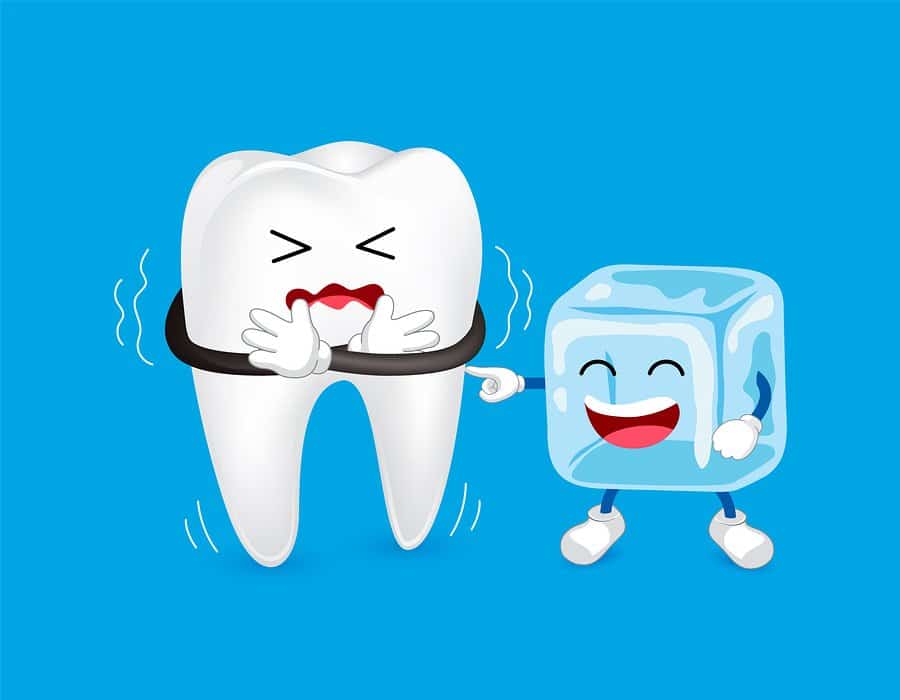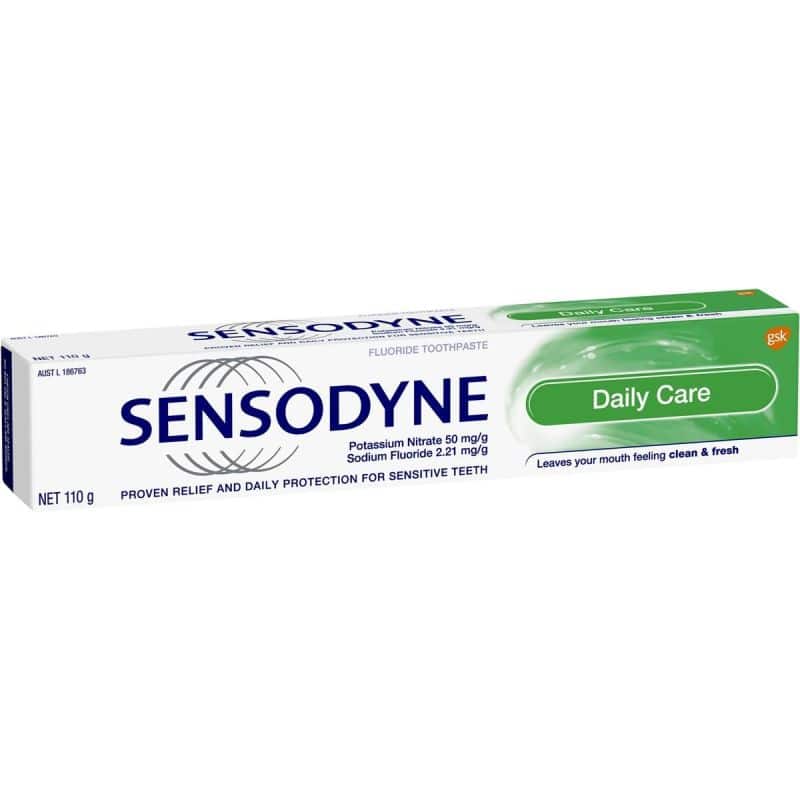You’re sensitive. Um excuse me? No I mean your teeth of course. After all, is there anything that pushes buttons more than being told your sensitive? Sensitivity is, well, a sensitive topic. But, when it comes to teeth, there are fortunately options available to remedy the situation. Enter Sensodyne toothpaste.
Sensodyne toothpaste is one of the most common brands that people reach for when they have sensitive teeth. In this article, we’ll talk about what it is, how Sensodyne toothpaste works, what’s in it, and discuss which is the best toothpaste for sensitive teeth.
What is Sensodyne Toothpaste
Sensodyne is a brand of toothpaste for sensitive teeth. It’s one of the few brands which is entirely marketed with the focused position of reducing tooth sensitivity.
The concept is simple. The Sensodyne toothpastes all have ingredients that help to reduce tooth sensitivity, whether it’s one tooth or all your teeth. We’ll get to the specifics on the ingredients later, but the idea is simply… reduce tooth sensitivity over time by brushing your teeth as you normally would.
Sensodyne toothpaste is a brand leader. And although I do highly recommend Sensodyne toothpaste to patients with sensitive teeth, it’s important to understand that many of its ingredients are not proprietary. The active ingredients can also be found in other brands that are producing toothpaste for sensitive teeth. You’ll just need to know what to look for.
So if you go with Sensodyne, you’re choosing the brand leader. It’s like how Kleenex is for tissues. However, there are other options available with similar active ingredients and quality.
What Causes Sensitive Teeth

Before we can get into the nitty-gritty of how to select a toothpaste for sensitive teeth, let’s just touch on what causes sensitive teeth in the first place.
There are many causes of sensitive teeth, but lets talk about the most common. It has to do with the exposure of the inner parts of the teeth—either the dentin or the cementum. Allow me to explain.
The teeth are composed of various layers. The outermost layer is the enamel. Think of the enamel like a helmet. It protects the inner parts of the teeth which are much more sensitive to touch and temperature.
If there is wear on the enamel, a fracture, or a cavity…the protective helmet becomes compromised. The layer under the enamel, the dentin, begins to feel more sensations. That’s one way how tooth sensitivity occurs.
Okay so we talked about the sensitivity of the teeth, but there is another way tooth sensitivity occurs. Can the roots of the teeth create sensitivity? You bet they can.
The roots of the teeth are usually covered by gum tissue. When the gum tissue recedes, wears away, or is inflamed, it exposes the root of the tooth. The roots of the teeth are not protected by enamel. They are composed of what’s called cementum…a highly sensitive part of the tooth.
So in people where there is loss of gum tissue, the roots of the teeth begin to expose and bingo…there’s tooth sensitivity. Even a small amount of gum recession can cause sensitivity to cold drinks or frigid air.
How Does Sensodyne Toothpaste Work
All Sensodyne toothpaste contains fluoride for cavity prevention just like many brands. However, Sensodyne toothpaste is a bit different because there are also two primary active ingredients in many of the Sensodyne toothpaste: Potassium Nitrate or Stannous Fluoride.
Potassium Nitrate
Potassium nitrate works by soothing the nerves of the teeth. It does this by blocking fluid sensitivity from entering the tubules of the teeth, which are essentially microscopic pores of the teeth. The ingredient effectively prevents zings of pains from bursts of cold water or touch. Sensodyne utilizes potassium nitrate in many of their toothpastes.
And science agrees, a 2012 study found that potassium nitrate was effective in reducing the symptoms of dentinal hypersensitivity when used either as toothpaste or as a mouthwash.
A second study in the journal of the American dental association found twice-daily use of a 3% potassium mouth rinse, adjunctive to toothbrushing with fluoride toothpaste, provided significant improvements in sensitivity.
That’s great news for people with tooth sensitivity.
Stannous Fluoride
Stannous fluoride is another common active ingredient in Sensodyne toothpaste, and it works similar to potassium nitrate.
Remember how we talked about how teeth have microscopic pores called dentin tubules? Well, stannous fluoride blocks exposed dentin tubules. It securely adheres to the walls of the tubules and helps prevent the movement of fluid microscopically in the tubules of the teeth.
Sensodyne equates the process to a shield. They say the stannous fluoride creates a shield that protects the inner more sensitive parts of the tooth from the elements.
And yes, the studies do support these claims. A 2011 study found stannous fluoride toothpastes provided significantly better immediate and ongoing sensitivity relief compared to controls.
What is the Best Sensodyne Toothpaste
What you should know is that there isn’t a single best toothpaste brand or model that works best. And trust me, there are plenty of top sellers. You can check them here.
But it all comes down to the active ingredients.
If you have quite sensitive teeth, read the ingredients of the toothpaste and compare the active ingredients. Look for the toothpastes that have a higher percentage of potassium nitrate, stannous fluoride, or ideally both. Choosing the Sensodyne toothpaste brand makes your choice a little easier as all are designed with sensitive teeth in mind.
If reducing sensitivity is your primary goal, try to stay away from the whitening toothpastes, even within the Sensodyne lineup. All whitening toothpastes and kits generally create some level of tooth sensitivity as a compromise for whitening the teeth.
It’s simple science. For all whitening agents to be effective, it needs to clean out the tubules of the teeth and essentially expose them. That process works against the agents which are trying to reduce sensitivity.
The Bottom Line
If you have sensitive teeth there are several options for toothpaste to help improve the situation. Sensodyne toothpaste is rightfully so, high on the list. Be mindful to check for the percentages of the most proven ingredients— potassium nitrate or stannous fluoride.
You should also know that tooth sensitivity can also be a sign that there is an underlying problem with your teeth that needs to be corrected. Other possible causes of tooth sensitivity are sinus pressure and issues with the alignment of the teeth.
If you are having prolonged sensitivity be sure to discuss with your dentist to rule out if there are other factors that may be treated.


